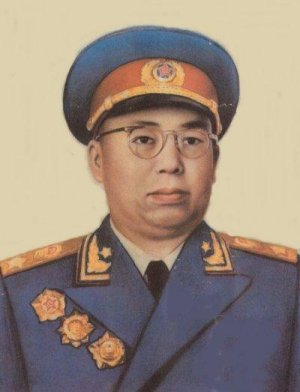
|
Long March Leaders
Marshal Liu Bocheng Liu was born in Sichuan in 1892. "One-eyed" Liu, with Deng Xiaoping, directed the 129th Division, the best in the People's Liberation Army, against the Japanese. When the 129th was expanded into the Second Field Army, Liu led it against Chiang Kai-Shek. At the beginning of the Long March, he was Chief of Staff of the Central Committee. He often and openly disputed the advice and direction taken by Otto Braun, a German sent by Moscow to direct the Red Army. On the Long March, Liu Bocheng (pronounced Lee-Yu Bow-Chung) strongly supported Mao at the Zunyi Conference. He is described as a genial bespectacled, battle-scarred Red Army officer, but also as an one-eyed dragon. Liu spent nine days and nights on a ten foot high boulder directing the Golden Sands crossing of the Yangtze River. At the end of the crossing, he set up machine guns to protect the rear guard from the rapidly advancing KMT forces. Liu drank a "chicken-blood oath" with the leader of the Yi minority, Xiao Yedan, in order to become a blood brother and to secure a safe passage through the Yi territory for the Red Army. Zhang Guotao and his Fourth Front Army held Liu prisoner for a year. He strongly defended Zhu De who was also being held prisoner. He once said to Zheng, "What do you mean treating Zhu De like this." During this time, he was wounded at the crossing of the river Wei. Later he managed to escape. In 1938 Zhang slipped away to join Chiang and the KMT. Lui and Deng Xiaoping commanded the 2nd Field Army in the civil war and made the first attempt to attack "Da Bie Mountains," which is just north of Nanjing. It took them a year to become strong enough to join Chen Yi's 3rd Army. Liu's Second Front Army and Chen Yi's Third Front Army cleaned up the KMT forces south of the Yangtze, which cost Chiang Kai-Shek a million men and sealed his fate. On May 27th, Shanghai fell to Liu and Chen's forces. By December Chiang abandoned the mainland and fled to his refuge in Taiwan. At the founding ceremony of the People's Republic of China on October 1st, 1949, Liu was on the reviewing stand with Chairman Mao. In the Autumn of 1951, Liu was able to occupy Tibet. In 1984 he was ninety-two, the oldest surviving member of the Long March command. |
|
| Marshal Liu Bocheng | ||
|
On to Marshal He Long Return to Long March Choices |
||